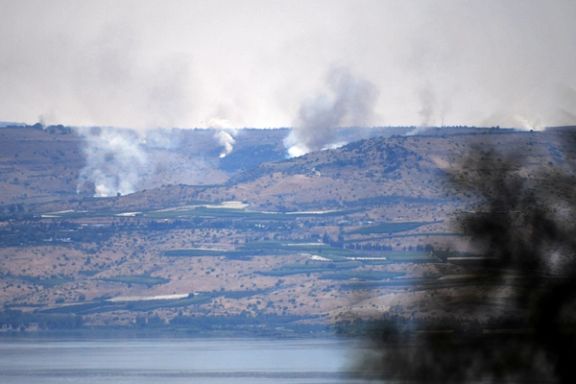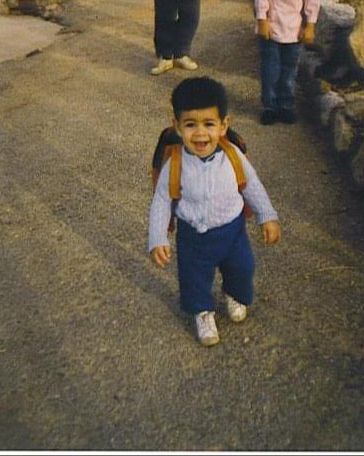'We fled Hezbollah, now they're hunting us again'

An Israeli Lebanese citizen says he was forced to flee his beloved motherland Lebanon 20 years ago because of Iran-backed Hezbollah, but now those same forces are terrorizing him all over again.

An Israeli Lebanese citizen says he was forced to flee his beloved motherland Lebanon 20 years ago because of Iran-backed Hezbollah, but now those same forces are terrorizing him all over again.
Jonathan Elkoury fled Southern Lebanon as a child, seeking refuge in Israel, a place he now calls home.
“We fled away from Hezbollah, and now they're hunting us back again,” Elkoury told Iran International, as Israel and Lebanon's Hezbollah get closer to a full-blown war.
The 32-year-old lives in Israel’s largest northern city, Haifa.
“We have been under constant, daily, threat from Hezbollah since October 8th,” he said.
According to the Alma Research Center, a facility that disseminates information about Israel's security challenges in the North, Hezbollah has launched 29 attacks against Israel using “high-trajectory fire, anti-tank missiles and suicide UAVs from July 3-4.”
Lieutenant Colonel Sarit Zehavi, a former intelligence officer in the Israeli Defense Forces (IDF), and head of Alma, said Hezbollah launched “200 rocket” and “20 drones” at Israel on Thursday.
Reuters reported on Thursday that Hezbollah claimed responsibility for the barrage of rockets and drones in Israel, and said the attacks were a retaliation for the killing of a top Hezbollah commander - Mohammed Nasser on Wednesday.
Some of the drones and interceptor shrapnel set off fires, according to Reuters, citing the Israeli military.
This is just the latest in a dangerous escalation of violence, which has seen an estimated 60 thousand Israeli residents living between 0-5km from the Lebanon border, displaced.
“Since this war started, Hezbollah launched, 2300 attacks against Israel,” said Zehavi.
She said the attacks have been deadly with “nine civilians” and “18 soldiers" killed in the northern front of Israel.
The Hezbollah strikes have led to massive forest fires that have devastated the agriculture-dependent region, putting the lives of farmers cultivating their land at risk.
Elkoury said his background as a Lebanese and Israeli gives him a unique perspective on this war. In his view, Lebanon needs to understand that peace with Israel will lead to its salvation.
The constant threat of Hezbollah for Elkoury is worrisome, he told Iran International. He believes the escalation is a turning point in the conflict, and said Hezbollah is “dragging Lebanon to a war that has nothing to do with Lebanon.”
“Lebanon's salvation could come with having peace with Israel because Lebanon is in a huge economic crisis and Hezbollah's actions are only driving Lebanon down.”
He said he remembers as a child that Hezbollah’s takeover turned his life into misery.

“They [Hezbollah] would come in and terrorize the villages. They will come and basically say, you're now obeying us. They made up checkpoints. They did everything in order to make our lives more miserable. And bit by bit, they started taking over all of Lebanon."
He said he remembers stories of people being kidnapped by Hezbollah.
His father belonged to the South Lebanon Army that was fighting alongside the IDF to protect against Hezbollah, but once the IDF pulled out in 2000, the army collapsed.
More than 680 Lebanese families, like Elkoury, fled to Israel.
On 24 May 2000 Israel withdrew from Southern Lebanon after 22 years, under the direction of then president Ehud Barak. Barak also faced immense domestic pressure to withdraw from the grass roots organization, ‘Four Mothers,’ who were the mothers of IDF soldiers killed in Southern Lebanon.
The UN Security Council said that Israel had completed its withdrawal as required by Resolution 425 of 1978. The significance of that move is considerable to the Middle East today, said Elkoury.
The Lebanese-Israeli said the only explanation that has led to more Hezbollah attacks is the Islamic Republic of Iran.
“Hezbollah, at the end of the day, answers for one person, and this is Iran,” he said.
The US government in 2018 stated that Iran funds Hezbollah with an estimated 700 million dollars a year. Prior to that, in 2016 the leader of Hezbollah, Hassan Nasrallah declared publicly in a speech that his organization’s funding comes directly from Iran.
Israeli Security expert Sarit Zehavi said in addition to the financial and tactical support from Tehran, there is also a body of evidence to prove Iran’s direct involvement.
“Beyond the anti-tank missiles that are manufactured in Iran… the drones are either coming in from Iran completely or the components are coming from Iran.… The rockets, maybe both from Iran and in Lebanon itself.”
Zehavi said Iran is creating “a war of attrition” that will last “several years” as part of “multi-front campaign against the state of Israel,’ which she said started with Hamas in the South.
While Elkoury is a proud Israeli, he also wears a pendant of the cedar tree around his neck, a symbol of Lebanon, a reminder of his roots and his homeland that he longs to visit one day.
"This is something that makes me sad because we are at war, where we shouldn't be at war."